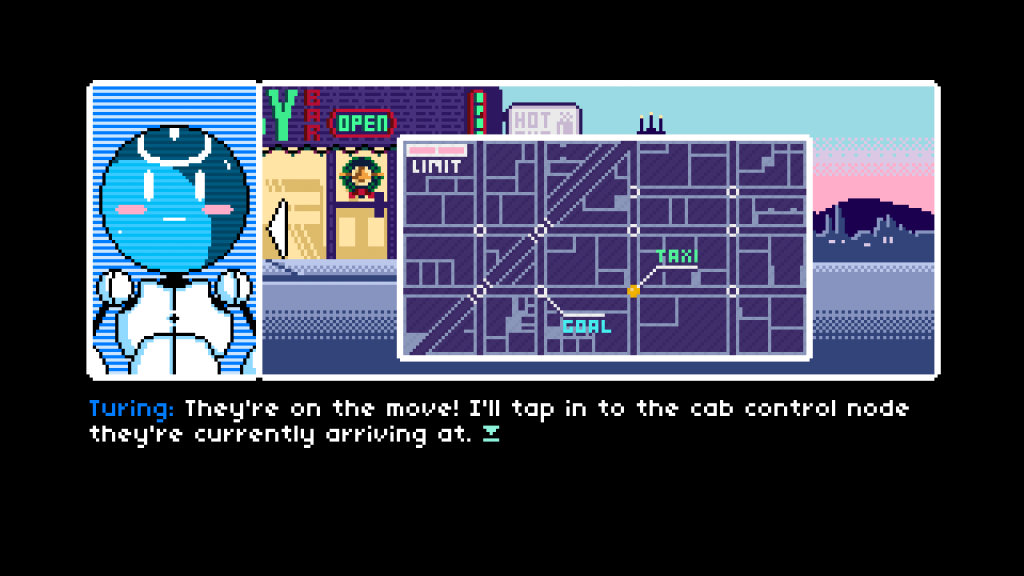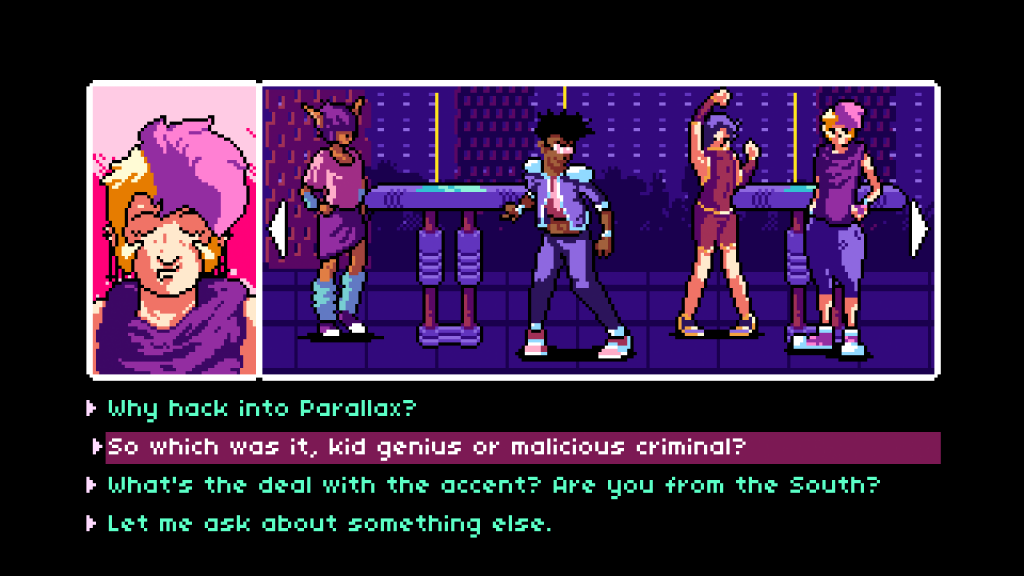Read Only Memories
MidBoss
October 6, 2015
It almost feels like we—fundamentally flawed, imperfect humans—will always find something to fear. However, in Read Only Memories, queer identities are accepted without question, and that’s not only a breath of fresh air but something that should be expected of game developers by now.
LGBTQA+ fiction frequently focuses on the pain of being someone who is not cisgender or heteronormative. Considering the way our current society treats LGBTQA+ people, those storylines are entirely valid. However, there’s more to someone than how society perceives them. We can have action heroes who are transgender and stories that end with two women getting their happily ever after. Read Only Memories presents its queer characters unapologetically.
Cold weather slips over Neo-Francisco at the end of 2064. Machines called ROMs are commonplace and assist people in their daily lives from the police to independent store owners. Their programming makes them useful to humans, but they’re just that—machines who follow orders until one day a ROM breaks into your apartment (cracking through the electronic door lock with relative ease and then laughing at themself upon realizing the window was open) and demands your help.
You are a journalist trying to make enough money to live in Neo-San Francisco (and failing at that). This ROM, named Turing, comes to you for help in locating your old friend—and Turing’s creator—Hayden, who Turing believes was kidnapped. They refuse to go to the police for fear of large corporations and bureaucracy being involved.
ROM’s Neo-San Francisco is colorful and accepting without question of the diverse people who populate the city. Developer MidBoss draws on aesthetics from older cyberpunk games with “high definition graphics that will knock your socks off circa 1988,” as MidBoss states, and a soundtrack of synth beats delivers home the familiar cyberpunk sound. I do wish MidBoss had given an option of changing the text font to something more readable, though. The pixilated text fits in with the theming, but a few hours of reading through paragraphs upon paragraphs of text made my eyes strain.

There may be some darker aspects to Neo-San Francisco, but this world respects people’s identities. Turing asks for your pronouns and does not question them. When Turing is later asked the same question, they admit they haven’t given personal pronouns much thought, but still opts for the gender-neutral “they.” Like most futuristic sci-fi, our future seems bright. We’ll have finally accepted each other.
Read Only Memories is smarter than that, though. Different sexualities and gender identities are all considered normal by the public, but now there’s a similar fear of becoming too inhuman. A group of people called The Human Revolution protest against “hybrids,” people who are genetically and technologically modified humans. Where there’s an other, you can be sure humans will bask in willful ignorance. The Human Revolution protests outside gene therapy clinics, where hybrids go for treatment, in a way that feels a lot like the same people attacking Planned Parenthood or health care for transgender people.
Our future isn’t really that different from our present; things just shift from one issue to another. While the genotypical discriminate against the hybrids, the tech sector of Neo-San Francisco has developed killing machines and is now working on artificial intelligence, but for ill means. Is it any surprise that the tech sector would use the ideal of public service to mask its real goal of control?
Turing, the first sapient machine, knows little of his creation, and as you and Turing try to find Hayden, you will also learn about Hayden’s work at the tech company Parallax and how Turing came to be. Turing is always questioning why Hayden made them the way he did, how they have the freedom to make decisions and mistakes. When Turing is confronted with some painful truths about Hayden’s work, they become frustrated, confused—angry, even. If being human is more about individuality than flesh and bones, Turing is very much human.
Through all of the investigation, Turing becomes more important than ever, and they ask some uncomfortable, but important questions of you. Would you give ROMs sapience? Or would you keep them the way they are, servants to humans? With the Human Revolution staunchly against hybrids, it’s pretty clear machines suddenly become individuals would lead to a panic. There are times you overstep your bounds and treat Turing as just a cute robot rather than as a person. You have privilege, and that puts Turing in an uncomfortable position of having to call you out after being considered your property. I even wish Turing had been madder.
Read Only Memories places you in this flawed, similar world to our own of 2015, but the game’s flaw is that it does not give these deep conflicts the attention they deserve. I wish the game didn’t end where it does because there’s always so much more to address in the consequences of your decisions than the decision itself. ROM has multiple endings, changing based on what you choose to do, and while I felt I got a typical “good ending,” I know my choices triggered series of consequences that will lead to more fighting. 2065 will probably be harder to cope with than 2064.
Parts of ROM are tense—not the click frantically on the screen tense, but chew on your pencil while you decide what to do or say tense. The game is hard and confusing sometimes, which led to me making mistakes while trying to stop a getaway car. This isn’t the kind of game that slaps you across the face when you make those mistakes; you can get a second chance, and even if you mess up again, that doesn’t mean it’s a game over. Read Only Memories doesn’t ask you to be a skilled gamer because it’s more interested in presenting you challenges through conversations. Even the “final boss” is a conversation, and a climactic one, too.
to do or say tense. The game is hard and confusing sometimes, which led to me making mistakes while trying to stop a getaway car. This isn’t the kind of game that slaps you across the face when you make those mistakes; you can get a second chance, and even if you mess up again, that doesn’t mean it’s a game over. Read Only Memories doesn’t ask you to be a skilled gamer because it’s more interested in presenting you challenges through conversations. Even the “final boss” is a conversation, and a climactic one, too.
Midboss, the studio also behind documentary Gaming in Color and the queer gaming convention GaymerX (continuing as GX3 this year), cares about making diverse characters a norm. When traditional gamers counter calls for diversity with “well, then make your own game,” there are developers who deliver on that. A future in which we don’t need to shout for visibility is becoming clearer, just as I believe the future in which all gender identities and sexualities will be accepted will leave behind the ignorant. However, there will always be people who find some other group of people to hate, and our own unchecked privilege will cause others harm if we do not make a conscious effort to be empathetic.


